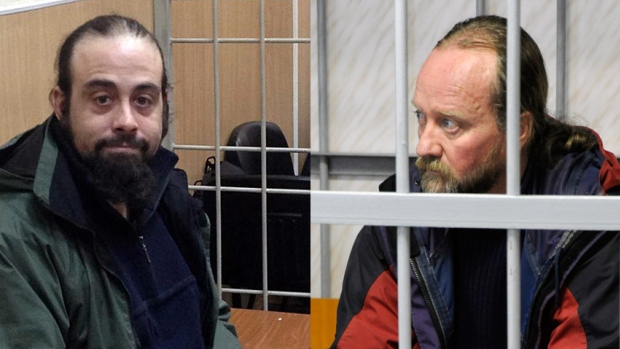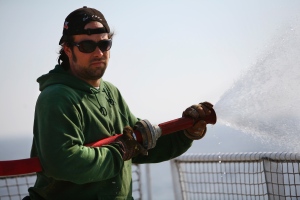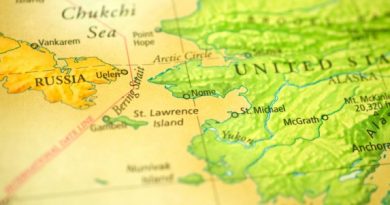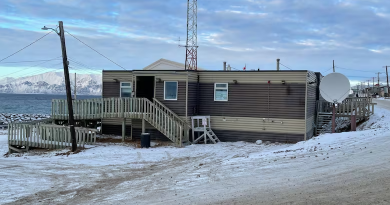6 Greenpeace protesters released on bail in Russia

Six jailed foreign Greenpeace activists were granted bail by Russian courts on Tuesday, rulings that lawyers said will allow them to return home pending trial for a protest against Arctic offshore oil drilling.
The activists from New Zealand, Brazil, Argentina, Canada, Italy and Poland were ordered released in hearings to determine whether 30 people arrested in a protest at an drilling rig in September should remain in custody past Nov. 24.
Canadian Paul Ruzycki was among those cleared for release. The second Canadian in the group, Alexandre Paul, is scheduled for a bail hearing on Thursday.
The activists from New Zealand, Brazil, Argentina, Canada, Italy and Poland were ordered released in hearings to determine whether 30 people arrested in a protest at an drilling rig in September should remain in custody past Nov. 24.
One activist has been ordered held further and all face up to seven years in prison if convicted. But the rulings signaled a shift in Russia’s handling of the case, which has added to Western criticism during President Vladimir Putin’s third term.
Courts had repeatedly refused to free them on bail in previous hearings since their arrest.

They are charged with hooliganism over the protest, in which some tried to scale an oil platform in the Pechora Sea that is Russia’s first offshore rig in the Arctic and is crucial to its drive to tap the region’s energy resources.
On Monday, courts in St. Petersburg ordered three Russians released on 2 million roubles ($63,800 Cdn) bail but ruled that Colin Russell, an Australian, can be held until Feb. 24.
Investigators have sought three-month extensions of detention for the activists, who come from 18 countries, but the Kremlin may believe releasing some on bail could ease criticism of Russia, which will be in the spotlight when it hosts the Winter Olympics in February.
Western leaders, including German Chancellor Angela Merkel, have expressed concern to Putin over the case and Western celebrities have voiced support for the Greenpeace campaigners. Ex-Beatle Sir Paul McCartney has asked Putin to help secure their release.
The activists granted bail on Tuesday are to be released when bail has been paid. They are:
- Paul Ruzycki of Canada.
- David Haussmann of New Zealand.
- Ana Paula Maciel of Brazil.
- Camila Speziale of Argentina.
- Tomasz Dziemianczuk of Poland.
- Cristian D’Alessandro of Italy
Maciel, 31, who held up a hand-written sign during the hearing that read, “Illegal Prison, Shame on Russia,” broke into tears of joy as the judge read the ruling.

Haussmann, 49, an electric engineer on the Arctic Sunrise, the Greenpeace icebreaker that was used in the protest at the Prirazlomnaya oil platform, described the decision as the victory of “common sense”.
Speaking from the defendant’s cage in court, he told reporters he would fly home to New Zealand to be with his 3-year-old son and his pregnant partner.
“I will hug my partner Sara and my boy Theo,” he said, smiling. “I’ll be much happier when I’m home.”
The activists granted bail will be freed once the money comes through, which is likely this week.
The foreigners can leave Russia but are obliged by law to return if summoned by investigators, said Alexander Mukhortov, a lawyer representing Haussmann and other activists.
‘High farce’
The investigation is continuing and no trial date has been set.
Greenpeace called the case against the so-called Arctic 30 “a high farce,” saying the protest over the platform operated by state-controlled Russian energy giant Gazprom was peaceful and the charges are unfounded.
The environmental group says drilling for oil in the Arctic threatens region’s pristine and unique environment.
It hopes the release of the activists can be secured on Friday when the International Tribunal for the Law of the Sea is expected to rule in a case the Netherlands lodged against Russia. But Russia is boycotting the case, which means it is unlikely to adhere to the court’s ruling.
Putin has said that development and shipping in the regional are important to Russia’s economy and security.
The 30 activists had initially been charged with piracy, which is punishable by up to 15 years in prison. Putin has said they were clearly not pirates but that they violated the law.
Related Link:
Greenpeace Arctic 30: 2 Canadians jailed in Russia, CBC News
Ice-Blog: Greenpeace: Pirates, Hooligans – what next?
Greenpeace seeks Finnish support in Arctic row, Yle News
-With files from CBC News



